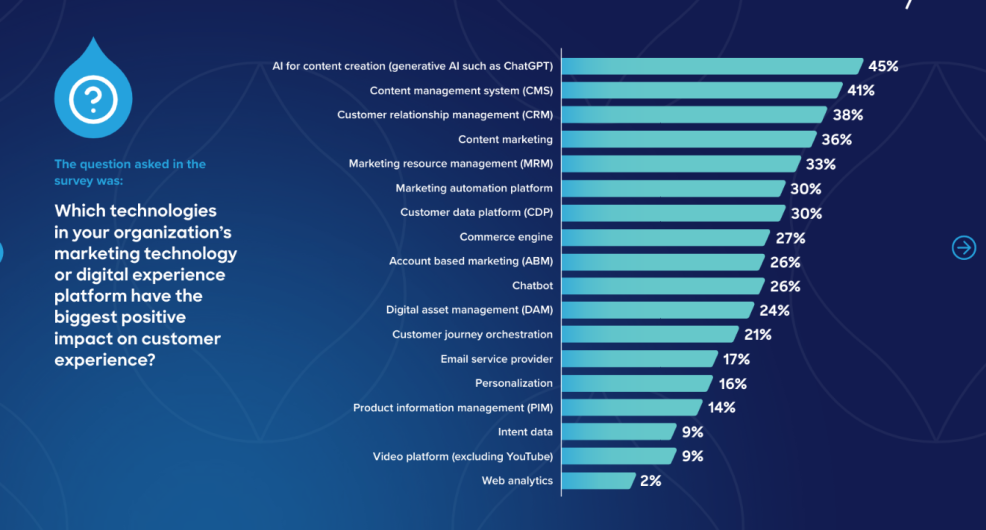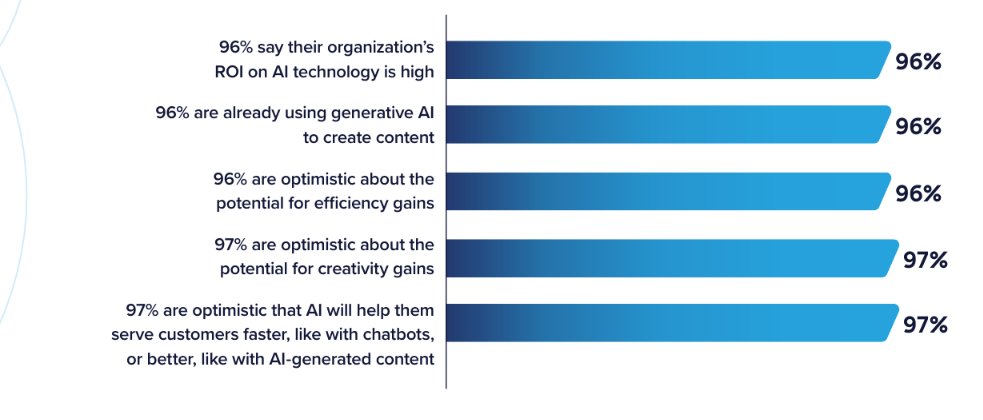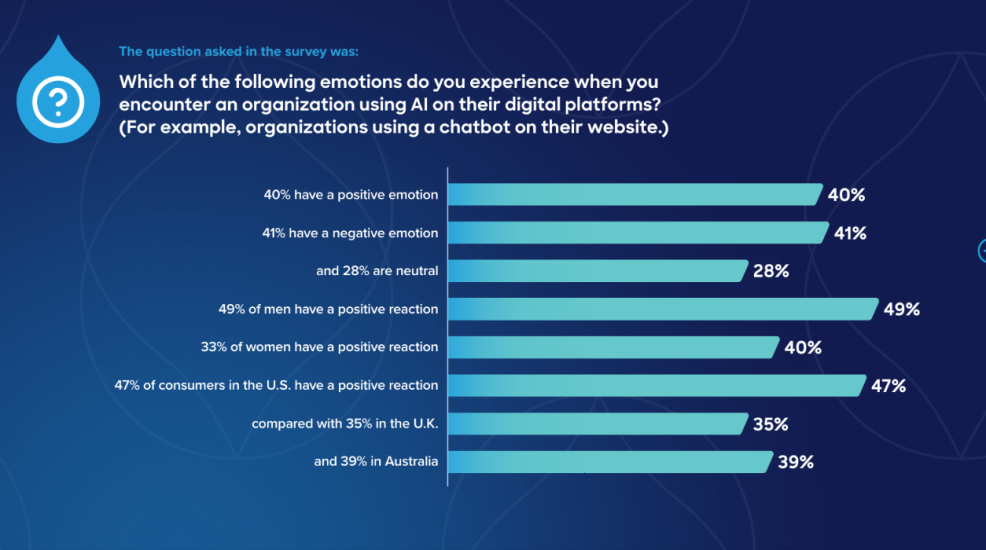Addressing the Artificial Intelligence (AI) Enthusiasm Gap

In digital marketing, the push for differentiation and innovation continues to intensify. Increasing competition and evolving consumer preferences create an environment where organizations must constantly differentiate and innovate to stay relevant and effective. That’s just one of the findings from our latest Customer Experience (CX) Trends Report that surveyed marketers and consumers from Australia, the UK, and the U.S.
We found that most marketers feel compelled to innovate their content strategies to differentiate themselves, often without extra funding. This trend is accompanied by a growing reliance on artificial intelligence (AI), particularly in content creation, with almost half of marketers identifying generative AI as a pivotal technology enhancing CX.
But consumers aren’t as convinced, with demographic and geographic factors impacting their attitudes toward AI. This contrast — between marketer enthusiasm and consumer apprehension — underscores the need for marketers to take a balanced, transparent, and human-centric approach when integrating AI into marketing strategies.
Marketers' attitudes toward AI
An overwhelming majority of marketers (83%) say they’re under pressure to deliver content differently to ensure their organizations can rise above the competition and stand out to prospects and customers. And nearly all say that they’ve recently changed their digital CX strategy to try and meet goals, frequently without the benefit of additional budget.
Marketers also indicated that they’re turning to artificial intelligence to help with content creation, with nearly half (45%) sharing that generative AI is one of the top technologies positively impacting CX.

Excitement about the ROI of AI
Marketers are excited about how the newest form of AI may change — and for many is already changing — the ways they create digital experiences. After all, marketers have grown comfortable with and seen the benefits of AI in other areas, like AI-powered customer data platforms (CDPs) that have allowed them to effectively personalize experiences.
Our survey found that nearly all marketers (96%) say that the ROI their organization receives from AI is high, and the same percent say they’re optimistic that AI will help them gain efficiency. A similar number (97%) indicate that they’re confident about AI allowing them to make creativity gains and that it will help them serve customers faster.

Concerns for AI use and security
However, while enthusiasm is through the roof, marketers realize they still have much to learn about AI. More than one-third say “understanding how to use AI” is one of their biggest martech challenges. And nearly 90% admit they’re concerned about using AI in marketing from a privacy or security standpoint.
Consumer enthusiasm for AI lags behind
While marketers appear to be all in on AI, many consumers are less enthusiastic. A minority (40%) indicate that they have a positive emotion when they encounter AI technology like a chatbot. Less than half (48%) say that they like using a brand’s chatbot to get answers to some of their questions.
A consumer’s age seems to impact how they feel about AI chatbots; the younger the consumer, the greater their openness to AI. Our survey found that 62% of Gen Z respondents like using chatbots, a number that decreases to 57% of Millennial respondents. Gen X and Baby Boomers are even less interested in AI chatbots, with just 42% and 29% respectively saying that they like using them. This indicates that marketers need to be mindful of their specific audience when rolling out AI-driven features to customers and not assume that their own enthusiasm is shared.
Consumers in the U.S. seem to be more open to AI than consumers in other areas. Nearly half (47%) of U.S. consumers say they have a positive reaction to an AI chatbot, whereas just 39% of Australian consumers and 35% of UK consumers indicate the same. Additionally, men are more likely than women to positively react to AI — 49% of men versus just 33% of women.

Why are some consumers less enthusiastic about AI?
It was beyond the scope of our survey to seek to understand why consumers feel positively or negatively about AI, but the 2023 “Hope, Fear, and AI” report by The Verge and Vox Media Insights and Research sheds light on some common hesitations.
Consumers' attitudes toward AI are complex and nuanced. The Vox/Verge study found that many Americans use AI tools and discussions about AI are common, especially among younger generations. However, there's a clear demand for transparency, with 78% of respondents wanting AI use in digital content to be disclosed.
Concerns about AI taking jobs are also prevalent, and there's a growing recognition of the need for societal adaptation to AI advancements. This indicates a mix of enthusiasm and caution among consumers regarding AI, reflecting its potential benefits and challenges.
However, much of the concern on the part of consumers may simply be fear of the unknown. A 2023 Ipsos poll found that only a small fraction of Americans (16%) report using a text or visual generative AI system. And of that 16%, the most common use of AI was for creating art, pictures, or images (41%), followed by creating text for their job (21%) and doing schoolwork (11%).
As consumers continue to encounter and use AI on their own, they may recognize more of its benefits and grow more comfortable with it. But this won’t happen overnight. Until then, marketers must remain aware that their customers and prospects may not share their enthusiasm for AI, and understand that sentiment about AI varies substantially across generations and geographies. Marketers also cannot ignore the fact that any AI-created content and experiences must contribute to their brand’s carefully orchestrated user experience and support the brand’s essence.
How marketers can reassure AI-leery consumers
Overall, while AI presents marketers with vast opportunities, it also requires a careful, considerate, and customer-centric approach to fully leverage its benefits while addressing consumer concerns. Here are some things marketers can do to help ensure they’re using AI in a way that effectively serves customers and prospects — and alleviates their concerns:
- Provide education and transparency: Given that many consumers are wary of AI — especially in areas like privacy and security — focus on being transparent about how you use AI. This includes communicating what data is being collected, how it is being used, and the measures your organization takes to protect consumers’ privacy. Educating consumers about the benefits and safeguards of AI can help build trust.
- Enhancing personalization cautiously: While AI can facilitate highly personalized marketing, you need to balance this with respect for consumer privacy. Ensure that your personalization strategies don’t make consumers feel monitored, uncomfortable, or like your business has overstepped boundaries.
- Focus on human-centric approaches: While AI brings numerous efficiencies and advancements, consumers have indicated a clear preference for human interaction and demand a “human touch” in certain aspects of the customer experience. Ensure you’re using AI to enhance, not replace, the human elements of your brand interactions.
- Prepare for regulatory compliance: As consumer concerns often lead to regulatory actions, you must anticipate and prepare for potential regulations surrounding AI use. This includes adhering to existing data protection laws and staying updated with any emerging AI-specific legislation.
- Build brand trust: To counteract the negative perceptions of AI, you should make it a priority to build and maintain trust. This means you must use AI responsibly, and consistently deliver on your brand promises and values.
To learn more about how new technologies like AI will shape the future of customer experiences, please download “State of the Marketer: Creating Compelling Customer Experiences in Challenging Times (CX Trends Report).”


